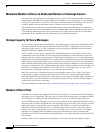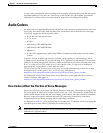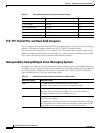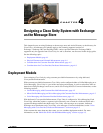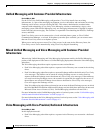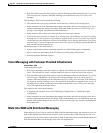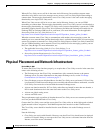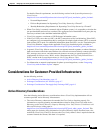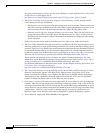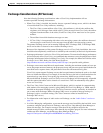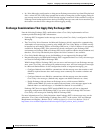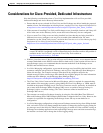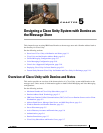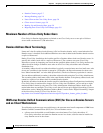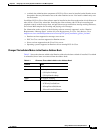
4-6
Design Guide for Cisco Unity Release 5.x
OL-14619-01
Chapter 4 Designing a Cisco Unity System with Exchange as the Message Store
Considerations for Customer-Provided Infrastructure
For general information on Cisco Unity and Active Directory, see the applicable Cisco Unity Data
and the Directory white paper, also at
http://www.cisco.com/en/US/products/sw/voicesw/ps2237/prod_white_papers_list.html.
• The main Cisco Unity services log on by using two Active Directory accounts that the installer
creates during Cisco
Unity installation:
–
Message store services log on by using the message store services account. These services send
and receive messages on behalf of the subscriber. The account with which these services log on
must have direct access to the Exchange message store where the subscribers reside.
–
Directory services log on by using the directory services account. These services write to user,
group, and contact objects when the objects are imported into Cisco
Unity, and they write to
individual subscriber properties when a subscriber or an administrator changes personal settings
for the subscriber.
Each service account can be used by more than one Cisco Unity server in the same domain.
• The Cisco Unity installation, message store services, and directory services accounts require Active
Directory permissions to create objects during installation and to manage the objects during regular
operation. The Cisco
Unity Permissions wizard grants the required permissions automatically based
on options the installer chooses for the customer configuration. For a detailed explanation of the
permissions required, see the Help file Permissions Granted by the Cisco
Unity 5.0(1)+ Permissions
Wizard at
http://ciscounitytools.com/HelpFiles/PW501/PWHelpPermissionsSet_ENU.htm.
The installation and directory services accounts also require Exchange permissions. For more
information, see the Help file Delegating Exchange Administrative Control for Cisco
Unity 5.0(1)+
at
http://ciscounitytools.com/HelpFiles/PW501/PWHelpExchange_ENU.htm.
For additional information on the Permissions wizard, see the Help file Granting Permissions with
Cisco
Unity 5.0(1)+ Permissions Wizard at
http://ciscounitytools.com/HelpFiles/PW501/PWHelp_ENU.htm.
• The Cisco Unity directory service periodically queries the local DC and GC for changes to Active
Directory data that also appears in the SQL Server database on the Cisco
Unity server. If any
changes are found, the directory service updates the SQL Server or MSDE database accordingly.
These queries do not significantly affect the performance of the DC or GC unless a significant
number of changes have been made to Active Directory user accounts.
• Cisco Unity is an Active Directory site-aware application. If Active Directory sites are configured
correctly, when Cisco
Unity queries Active Directory for directory updates, a DC or GC in the site
will respond rather than a DC or GC in a remote site. In a Unified Messaging configuration, in which
Active Directory sites are already configured, this should not be an issue. For large Voice Messaging
configurations, with Cisco
Unity servers in multiple separate locations in a dedicated Active
Directory forest, Active Directory sites must be configured to respond intelligently to queries.
• Active Directory Application Mode (ADAM) is not supported.



